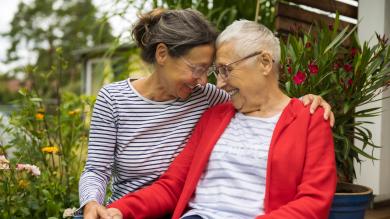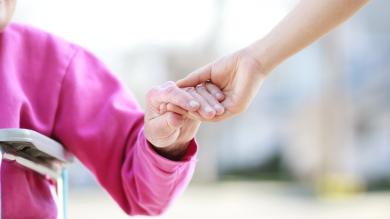
Children and young people in need of care: What to bear in mind
Children can also receive a care degree if they are limited in their ability to cope with everyday life due to a physical, mental or psychological illness or disability.
A care degree for children is not only granted for physical and mental disabilities, but also for chronic illnesses such as diabetes and rare or life-limiting illnesses. Developmental or behavioral disorders such as autism or ADHD can also be grounds for a care degree.
Figures on children in need of care
When people talk about care, they usually mean the elderly. However, more and more young people in Germany, including children and adolescents, are in need of care. Most care is provided at home by their parents.
At the end of 2021, there were around 272,000 children and young people up to the age of 19 in need of care in Germany (Federal Ministry of Health, 01/2023).
Around 1.3 million children in Germany live with a chronic illness. 320,000 to 400,000 children suffer from a life-limiting illness, of which around 190,000 are acutely life-threatening. Source: Nestwärme e.V.
Basic information on the care level
A person is considered to be in need of care if they are dependent on long-term (at least 6 months) or permanent support with everyday activities due to physical, mental or psychological impairments. Impairments must be present in the following modules:
- Module 1: Mobility
- Module 2: Cognitive and communicative skills
- Module 3 Behavioral and psychological problems
- Module 4: Self-sufficiency
- Module 5: Dealing with demands and stress caused by illness or therapy
- Module 6: Organization of everyday life and social contacts
The more severe the impairments in these modules, the more points are awarded. The number of points determines the level of care. For example, at least 27 points are required for care level 2.
What should I bear in mind when choosing a care level for children and young people?
As a general rule, children and adolescents of the appropriate age are used as a comparison for the assessment. From the age of 11, children are treated as adults in the classification.
This is important if you want to apply for a care degree for a child:
Application: You apply for a care degree at the responsible care insurance fund. You can usually download the application form online or request it from the long-term care insurance fund. It is also possible to submit an informal application by telephone.
Medical documents: It is helpful if you enclose medical documents or reports with the application that document the need for care - such as findings, diagnoses or reports from specialists.
Care needs assessment: The care insurance fund will carry out an assessment to determine the care needs. This involves looking at the extent to which the child is restricted in their activities of daily living. To do this, it is important to document all relevant information and observations.
Justification of the application: A detailed explanation of why a care degree is necessary can be helpful. Describe the child's specific limitations and support needs.
Deadlines and appeals: Pay attention to the deadlines for submitting and processing applications. If the application is rejected, you can lodge an appeal. In principle, benefits are granted from the date of application.
Application for downgrading: If you have been granted a care degree, you can apply to the care insurance fund for downgrading if necessary.
Before the assessment by the Medical Service of the Health Insurance Funds (MDK), ask for an expert with specialist knowledge, as the illnesses or problems of children differ considerably from those of adults. It is advisable to be well prepared for the appointment with the MDK.
Special features for children up to 18 months of age
Children aged 0 to 18 months are still dependent in many areas of life. For this reason, special regulations apply to the assessment and classification of children in need of care at this age (§ 14 Para. 2 No. 4 SGB XI, § 15 Para. 6 and 7 SGB XI).
Only modules 3 (behavior and psychological problems) and 5 (dealing with illness- or therapy-related demands and stress) are used in the assessment.
Exceptions: In Module 4, the "Feeding" point can be taken into account if the child has serious age-atypical difficulties with food intake, such as a cleft lip and palate. In this case, the child can receive a flat rate of 20 points in Module 4. For care-related reasons, children can also be assigned to care level 5 if they do not achieve the required number of points. This applies, for example, if both arms and legs are completely unable to function and the child cannot grasp, stand or walk.
In principle, children under 18 months of age are generally classified one care level higher than older children or adults with a comparable need for assistance. This special rule no longer applies after the age of 18 months.
It is generally difficult to obtain a care degree for very young children because they are compared with children without impairments - and very young children always have a great need for support.
Special features for children up to the age of 11
In general, for children up to the age of 11, modules 3 and 5 are treated independently of age. For all other modules, the impaired children are compared with "healthy" children of the same age.
The younger a child is, the more difficult it is to obtain a care degree, as a small child does not yet differ significantly from a "healthy" child of the same age in terms of care and support needs.
As modules 3 and 5 are age-independent, an infant or young child may also achieve a high score in these modules. Children with mental/emotional impairments or developmental disorders such as ADHD and autism could also achieve the maximum number of points in Module 3.
Special features for children with autism
Module 1: Autistic children often have coordination problems and therefore have difficulty climbing stairs, for example.
Module 2: Autism is often accompanied by cognitive impairments. These include spatial, temporal and situational disorientation. Autistic children are also often unaware of hunger or thirst. They need detailed instructions for all activities. Other points in Module 2 may apply.
Module 3: Several points apply to autistic children (and also to ADHD), including motor restlessness, stereotypical actions (stimming), aggressiveness (meltdowns), depression, anxiety or social abnormalities.
Module 4: Autistic children often have motor and sensory problems. Eating and drinking often need to be precisely arranged and monitored. Support with handling cutlery (fine motor skills) may also be necessary. Autistic children may also have problems showering and dressing and undressing.

Support in everyday life
There are various support services for parents of children with disabilities. A selection:
Advice centers: Various organizations offer advice for parents of children with disabilities, including on legal entitlements, financial support and offers of help.
Therapeutic offers: Physiotherapy, occupational therapy and speech therapy can help children with disabilities. Many of these therapies are covered by health insurance.
Self-help groups: Sharing experiences with other parents in similar situations can be a great relief. Self-help groups offer support, understanding and practical tips.
Financial assistance: Parents of disabled children may be entitled to various financial benefits, such as care allowance, integration assistance or tax relief.
Leisure activities: Special leisure activities and vacation camps for children with disabilities allow parents to take time out while their children are cared for.
Integration assistance: This can include personal assistance, e.g. in childcare center or schools. Contact persons are the district or the social welfare agency.
Recreational offers: Parent-child cures offer a good opportunity for recuperation. Information on spa facilities can be found at the Elly Heuss Knapp Foundation/German Mothers' Convalescent Home.
Helpful links
Mothers' Convalescent Home
AOK Care Navigator
Participation counseling
Family care time
Family caregivers can generally take family caregiver leave. This also applies to parents of children in need of care. This in turn results in facilitations such as flexible working hours, financial support and protection against dismissal.
As part of family care leave, employees can take partial leave from work for up to 24 months if they are caring for a close relative in need of care or a close relative in need of care at home. The entitlement also applies to the care of underage relatives in need of care at home or outside the home. You have the option of taking partial leave of absence for a minimum of 15 hours per week.
"Then we'll do it ourselves," said Petra Moske and Elisabeth Schuh when they realized that there was far too little support for families with children with special needs. 25 years ago, they founded the "nestwärme" association, which has since become an important support network in Germany, Austria and Luxembourg.
The founders provide insights into how they have mastered this path. Numerous case studies illustrate the variety of challenges that affected families face and show the positive impact of the work of "nestwärme".
By Petra Moske and Elisabeth Schuh, Bonifatius Verlag Paderborn, 2025
Source:









 (1).png/4c710762-3137-efdf-a95a-1ef231de5907/4c710762-3137-efdf-a95a-1ef231de5907?imageThumbnail=2)
